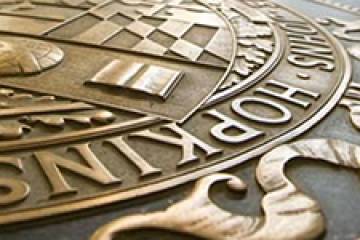Johns Hopkins University today announced it will expand support for its PhD students and programs, committing $1.5 million to a series of initiatives that include investments in mentoring, professional development, and data that can help students identify career paths and networking opportunities.
In a message sent to PhD students and full-time faculty, JHU President Ronald J. Daniels and Provost Sunil Kumar detailed these new investments and also described how they build upon other recent efforts to boost the quality of doctoral education at the university and strengthen support for doctoral students.
The university has begun in recent years to address changes in the post-graduate employment opportunities available to PhD students—a shift away from academic jobs toward a wide variety of careers that rely on the expertise and competencies gained during PhD training.
The university has also expanded support for PhD students with new options for dental and vision coverage, lower deductibles for health care, improved mental health coverage, and expanded childcare benefits for new parents.
"Johns Hopkins is proud of our seminal role in developing PhD education in the United States, and proud of the extraordinary students whose intellectual contributions have impacted our schools, and who deepen and enhance our PhD programs today," Daniels and Kumar wrote.
As part of the $1.5 million investment in PhD education, the university will:
- Invest in data resources that will make it easier to determine where Hopkins PhD graduates are employed, giving current students the opportunity to make connections that might boost their careers
- Hold a retreat for PhD program directors in early May to discuss the role of doctoral programs in exposing students to professional paths relevant to their training
- Establish a funding initiative for programs to host alumni panels, speakers, and other events relevant to professional development
- Launch the PhD Innovation Initiative 2.0, which will solicit proposals for building professional development opportunities into PhD programs
- Distribute a new set of Mentoring Expectations universitywide to clarify what is expected of both academic advisors and PhD students in mentor-mentee relationships
"There is hardly a theme that comes up more in my conversations with PhD students than mentoring," said Nancy Kass, vice provost for graduate and professional education. "By creating clearer universitywide mentoring expectations and supports, we hope to both continue to share best practices that are occurring in so many parts of the university, and to better equip new faculty and new students with a roadmap for their interactions and conversations together."
These investments add to recent and ongoing initiatives designed to help doctoral students make informed choices about their own training and career options. In September, the university announced the creation of an online database for all Hopkins PhD programs that includes admissions statistics, student demographics, student retention and completion, and duration of study.
The publication of these data represents an expansion of an effort that began in December 2017, when Johns Hopkins announced its founding membership in the Coalition for Next Generation Life Science, joining nine other leading universities and research institutes in agreeing to release regular public reports about biomedical science PhD programs.
Another soon-to-launch initiative called "PHutures," led by Farouk Dey, JHU's inaugural vice provost for integrative learning and life design, will build on the success of the East Baltimore Professional Development and Career Office to improve professional development services for PhD students at both the Homewood and East Baltimore campuses.
"PhD students' graduation exit surveys, and PhD students I have met with in the last year, both underscore that they want to learn more about a wide range of career options while they are still students," Kass said. "They also want to know more about where our PhD alumni go. We hope that the investments that the university is making in this space will be responsive to these important concerns."
Posted in University News








